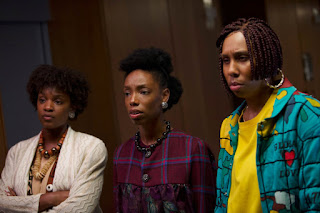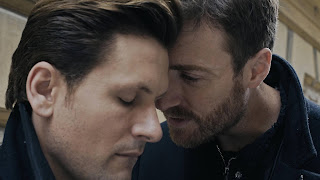Movie Review - Bad Hair (2020)
The bigotry or racism about black women's hair has been around for a long time. The recent Netflix series Self Made (2020) about Madam C. J. Walker delved into the history of the racism around black women's hair. Since the early 20th century, before World War I, black women were encouraged to use hair care products to straighten their natural curly hair, so that black women could have hair that looked more like white or European women. What's Love Got to Do with It (1993) was an example in film of the horror that a black women can face when dealing with hair discrimination and the need to make their hair seem like that of a white or European woman. Chris Rock's Good Hair (2009) is a documentary that really breaks down the issue comprehensively. It wasn't until Matthew A. Cherry's Oscar-winning short film Hair Love (2019) that a metaphor was made that made literal the fear toward or of black hair in terms of maintaining it.
Elle Lorraine (Insecure and Boomerang) stars as Anna Bludso, an aspiring TV producer and TV host in Los Angeles in 1989. Right now, she's no better than a secretary or assistant at a network that's akin to MTV or BET. Yet, she's recently been passed over for promotion and the rent at her apartment is rising, so she's struggling. She's also a bit timid and not assertive when it comes to her career. The reason she's so timid is related to insecurities she has about her hair.Vanessa Williams (Desperate Housewives and Ugly Betty) co-stars as Zora, the executive at the TV network. She's a supermodel turned TV executive. She's taking control of the programming on the network, which is currently headed by black women who push a natural and authentic, black aesthetic. Zora though wants to push an aesthetic that is more in line with the beauty standards of white or European women. Zora likes the long, straight hair aesthetic. Conformity to that mainstream, predominantly white aesthetic is what achieves success and Zora reinforces that conformity, instead of allowing Anna and the women like her to be natural and authentic to who they are.
The film is very nostalgic of late 80's and early 90's black culture, which is probably where a push-back began in the media over that natural black aesthetic versus the more European look. That nostalgia is actually quite effective and Simien effectively recreates the vibe of that era and the look of that era very well. If the film had remained simply that nostalgia trip, mixed with dramatic commentary about black beauty standards, that would have been enough. Yet, the film leans into being an over-the-top horror, which never really feels all that scary. There's a kill scene in this film that would've been more chilling, if I hadn't already seen it done better in HBO's Lovecraft Country in terms of a scene that combines sex, body horror and penetrative murder.Simien's film incorporates a lot of humor, so much that it could have put this film on the level of something like Ghostbusters (1984). It at times has that tone, but it's not consistent. It actually becomes more humorous as it gets to the end, as opposed to Ghostbusters that gets more serious and scary toward its end. Simien also builds to a very predictable ending that's a reverse to something that happens in Gremlins (1984). Because it was so predictable, I felt like I was waiting for it for too long. I also didn't understand the logic of what was happening. Supposedly, Anna is possessed by demonic hair. She's possessed by it, yet she's also pursued by other black women possessed and it's not clear as to why.
A better film that does balance the humor and horror tone and also plays on the issues and themes in this film is Mariama Diallo's Hair Wolf (2018), which is now streaming on HBO Max. This film is a bit of fun but not as balanced or carries as much of a punch as it could have.Rated TV-MA-LVS.
Running Time: 1 hr. and 43 mins.
Available on Hulu.














Comments
Post a Comment